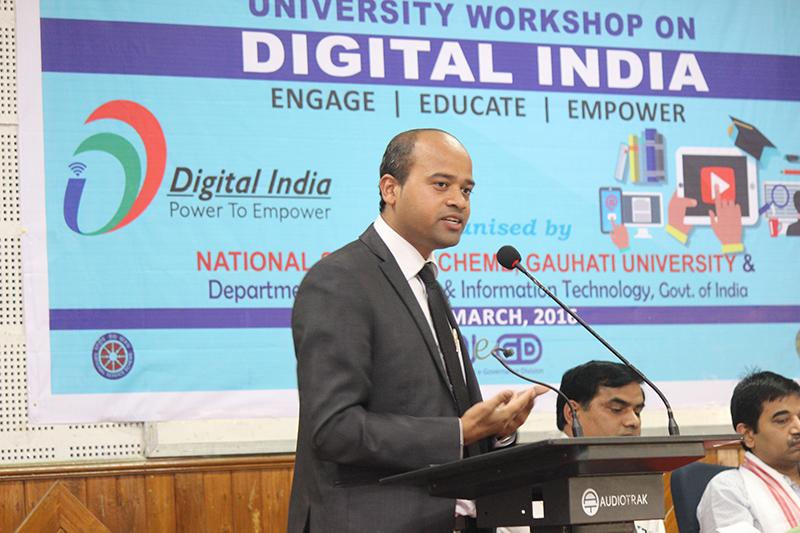
Manjit Nath had dreamt of attending the University of Oxford since he was a child. In fact, his desire to study in the city of dreaming spires – inspired by his father – prevented him from joining an insurgency in Assam as a teenager.
“I’d always been determined to be a part of something which would allow me to bring about meaningful change. Following a degree in computer science and engineering, and roles in both the private sector and within government, I took the decision to undertake a Master’s course that would provide me with a new outlook on subjects such as economics and political philosophy, so I could enhance my skill set and gain new perspectives on how to implement effective policy. I got into three top-tier schools, but there was no thought required – I had gotten into the Blavatnik School of Government at Oxford!”
Following a Summer Project placement at McKinsey in Amsterdam, Manjit decided to return to India. “It was an exciting time for me,” he said. “I wanted to challenge myself, and give back to the country – and more specifically, the region – that shaped me. The Blavatnik School inspired this in me; I felt like I should do something important. I also felt like I was able to look at issues through a different lens and bring positive and lasting changes.” Manjit intended to take up a role in government, but just weeks after returning home, his native area, Agia, flooded in a way not seen for over a decade. He headed up efforts to restore the area, by utilising skills learnt on the MPP, and organised assistance from NGOs and the local community, after which he took the decision to spend an entire year as a full-time volunteer – something he has written about for our blog.
Manjit’s passion was always to improve his country through implementing better policy. With this in mind, he joined the Indian government in New Delhi as a national consultant focused on youth affairs in the Ministry of Electronics and IT, and began working on an initiative called ‘Digital India’ which aims to create a digitally empowered society and economy of knowledge.
“I am currently working on a number of projects related to the scheme. One looks to engage citizens through an online platform that allows them to volunteer for tasks created by government departments and organisations (a similar initiative to the UN online volunteer scheme). Another, which ties into my primary responsibility of connecting the Indian youth with the programme, and is what I am particularly passionate about, is a series of workshops.”
Manjit and his team have designed a number of development workshops that are being held at 120 public universities across India. By the end of the project, he expects to have reached out to 32,000 students, and will have taught them the benefits of utilising technology to improve governance. “We have ensured that the workshops are fun and interactive to optimise engagement, and include competitions; a number of winners will be invited to the International Conference on Theory and Practice of Electronic Governance in Delhi. We’ve also seen students hold their own workshops in their local communities – becoming brand ambassadors - further spreading the vision of digitalisation and electronic governance in their communities; knowing this gives me immense satisfaction.”
 In setting up these large-scale, nation-wide workshops, Manjit has harnessed a number of skills he honed on the MPP. “The modules on data analytics, negotiations, budgeting and communication have proved invaluable; I’m so grateful for the breadth of knowledge I gained. I also find myself using the framework provided to us by Dr Maya Tudor in The Politics of Policymaking every time I’m required to dissect an issue!” He also notes the importance of the persuasive way in which he leant to write, and has been employing this skill in producing working papers analysing the impact of the Digital India programme on reducing gender inequality in the country.
In setting up these large-scale, nation-wide workshops, Manjit has harnessed a number of skills he honed on the MPP. “The modules on data analytics, negotiations, budgeting and communication have proved invaluable; I’m so grateful for the breadth of knowledge I gained. I also find myself using the framework provided to us by Dr Maya Tudor in The Politics of Policymaking every time I’m required to dissect an issue!” He also notes the importance of the persuasive way in which he leant to write, and has been employing this skill in producing working papers analysing the impact of the Digital India programme on reducing gender inequality in the country.
The Blavatnik School’s community is something Manjit cherishes, and he often meets up with other alumni. He has been in touch with numerous prospective students, too, helping with applications and answering questions. Two applicants, who reached out to him and asked for assistance in reviewing their applications, have just started the course. “I am over the moon,” said Manjit. “I feel so privileged to help other people achieve their dream of studying policy at Oxford!”
Read all of Manjit's contributions to the School's blog.
October 2016
